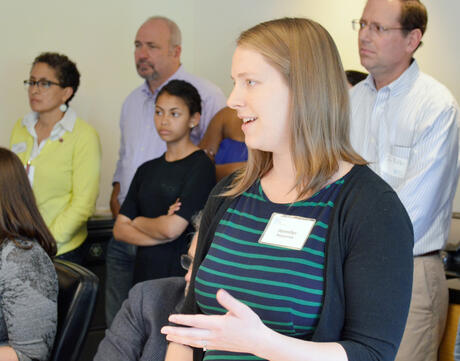
Empathy, Rigor, and Content: A Teacher’s Perspective
“I feel confident in my ability to guide students through historical content with a lens of empathy and academic rigor.”
- Jenny S.
From her early days in the classroom to today, longtime educator Jenny S. has relied on Facing History’s collections and resources to promote analytical thinking, deep engagement, and active listening in her classroom. She uses our tools to nurture her students' individual talents and model how vital it is to stand up and participate. Jenny credits Facing History’s professional development and in-person experiences with shaping her identity as a teacher.
Facing History: How has Facing History’s support helped you?
Jenny: Facing History has made me feel more assured and capable in bringing potentially controversial topics into a safe space where students can learn, engage, question, and discuss.
Your tools help me both in my day-to-day job and in long-term unit planning. When I first started teaching, I admit that I was a little overwhelmed at how much I still needed to learn in order to be effective in the classroom. But Facing History offers the perfect balance of content and lesson strategies to help new teachers navigate topics they may not have encountered. For example, I had never heard of the Armenian Genocide or the Nanjing Atrocities before starting to teach them.In an era of internet access and questionable information, I never have to question the quality and accuracy of Facing History resources. I always feel confident that the material is well curated to meet the needs and competency level of my students. I’ve also found that Facing History is profoundly helpful in teaching current events and hard topics. While bringing difficult conversations into the classroom can be tricky, Facing History is always my go-to for developing classroom conversations and activities that allow students to find an entry point into uncomfortable dialogues.
Facing History: How has Facing History sparked transformation in your classroom?
Jenny: I see transformations large and small in my classrooms. But one of the most rewarding things is watching students go from apathetic observer to engaged discussion leader. Especially when using materials for civic participation and elections, I have noticed a significant shift for many of my students in their understanding of the electoral process, consumption of information from media outlets, and perception of the political spectrum. Teaching elections can be challenging, especially more contentious ones that can divide a community. Having resources from Facing History helps students find a political voice in ways that feel safe and supported. I have heard language change—sometimes dramatically—as the young people around me grapple with the term upstander and start to stand up for what they believe is right and just.
Facing History: What’s a Facing History resource you use that you want other teachers to know about?
Jenny: I recently used resources from the Nanjing Atrocities collection with my ninth grade Modern World History students. This unit offers incredible historical context as part of a larger narrative. In this specific instance I was teaching about Japanese imperialism in China during the 1800s. The videos, readings, and primary sources on Japanese imperialism in Asia are so well curated and accessible for all students and all learning styles. The films in particular are incredibly useful for visual and auditory learners in my classroom and deepen their understanding of the content beyond notes and readings.
Facing History: What might the world look like if Facing History was in every school?
Jenny: Facing History is more than just historical content and lesson planning—it is a way of thinking, speaking, learning, and collaborating. It promotes empathy, understanding, and social justice. By engaging with Facing History, students can better navigate the complexity of their own experiences within the broader context of history and society.
If every school included Facing History in their curriculum, young people would encounter ways to build a community of trust that uplifts and promotes equality, equity, and respect. To imagine a nation led by those who have gone through a Facing History classroom is to imagine a future of tremendous possibility.
Facing History is dedicated to lifting up educators everywhere.
You can help teachers too!
Through donor funding, we design and lead professional training, host community learning events, and develop a wide range of classroom materials. All of this work is in service to teachers and their students. When you contribute to Facing History, you’re supporting teachers who make a world of difference—teachers like Jenny S.

